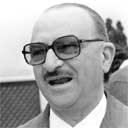The work of one of the most eclectic figures in Italian cinema, director Alberto Lattuada, who has died aged 90, spanned almost every genre. Though never quite accepted as an auteur, he helped to launch the career of Federico Fellini - in 1950, they co-directed Luci Del Varieta (Variety Lights) - a distinction that appeared only to give Lattuada something of an inferiority complex.
In the early 1970s, after reading an article of mine about leading figures in Italian cinema, which did not mention him, Lattuada climbed the stairs to my flat in Rome to deliver two little books that had just been published about him, one in France; I made sure to mention him in future. In more recent times, Gremese, which publishes glossy volumes on cult directors, added him to their list.
In truth, his reputation was more often boosted by his gifts as a talent scout for sexy young female stars. Among those he launched were Catherine Spaak, Clio Goldsmith and Nastasia Kinski, and he accepted, with a certain degree of pride, his fame as an adorer of nymphettes.
The son of the composer Felice Lattuada, Alberto grew up in Milan under fascism, which he detested. At 23, he graduated as an architect at the Milan Polytechnic and, while working at the Triennale, helped to found a film club that later became the Cineteca Italiana. His determination to organise a screening, on the eve of Italy's entry into the second world war, of Renoir's banned anti-war film, La Grande Illusion, got him into trouble with the police.
When, in 1941, the producer Carlo Ponti signed up novelist-director Mario Soldati to direct a film from Fogazzaro's novel, Piccolo Mondo Antico (Old-Fashioned World), Lattuada's father got his son his first job, working on the script and as assistant director. A year later, the young Lattuada made his first film, Giacomo L'Idealista (Giacomo The Idealist), based on a melodramatic novel by the 19th-century Lombard writer, Emilio De Marchi.
Forced into hiding in Rome because of his anti-fascist activity in Milan, Lattuada was only able to finish his second film, La Freccia Nel Fianco (The Arrow), another literary adaptation, after the liberation of 1944.
Then he helped to relaunch Italian cinema in a more realistic vein. After a documentary short, La Nostra Guerra (Our War), he made his own contribution to the golden moment of neo-realism with Il Bandito (The Bandit, 1946), starring Anna Magnani and Amedeo Nazzari, and, the same year, began his collaboration with another popular star, comedian Aldo Fabrizi.
It was Fabrizi who introduced Lattuada to the young Fellini, with whom he got along surprisingly well considering their very different characters and backgrounds. They worked together on the script of Il Delitto Di Giovanni Episcopo (Flesh Will Surrender), based on a novella by D'Annunzio, which Lattuada directed in late 1946.
Both their wives, Carla Del Poggio (Lattuada's) and Giulietta Masina (Fellini's), appeared in the film, and became good friends. The two men worked together again on an adaptation of one volume of Riccardo Bacchelli's ponderous novel II Mulino Del Po (The Mill On The Po), which had critical and box office success. Lattuada then returned to the traumatic dramas of postwar Italy with Senza Pieta (Without Pity), set in the underworld of Livorno; Fellini worked on the script.
Their wives both appeared in the film, and, in 1950, joined their husbands in a cooperative to make Luci Del Varieta, about the tribulations of a music-hall touring company, largely based on Fabrizi's anecdotes.
The production was well received, but Lattuada lost all his investment, so accepted Dino De Laurentiis's offer to direct Anna, starring Silvana Mangano. The resulting film blatantly exploited Silvana's sex appeal, but Lattuada enjoyed making it and the box office credibility he won enabled him to shoot what is generally considered to be his best film, Il Cappotto (The Overcoat). Gogol's story, adapted to an Italian setting, featured another popular comedian, Renato Rascel.
After a dignified adaptation of Verga's La Lupa (The She-Wolf), Lattuada directed an episode of Zavattini's neo-realist compendium on Italian male mores, Amore In Citta (Love In The City).
From 1953, when he made La Spiaggia (The Beach), starring Martine Carol, Lattuada dedicated himself to more or less commercial products - with an emphasis on female stars. But he continued to alternate with literary adaptations, sometimes on the level of colossal international productions, such as the English-speaking Tempest (1958), based on Pushkin's story, The Captain's Daughter, or from contemporary Italian novels, such as the delightful Venga A Prendere Il Cafe Da Noi (Come And Have Coffee With Us) by Piero Chiara, which was a hit in the US.
His best film in the 1960s was Il Mafioso (The Mafioso), in which he helped Alberto Sordi to give one of his best performances, as a miserable clerk who, in return for a family favour, finds himself obliged to become hit man for a mafia killing in New York.
In recent years, Lattuada found it increasingly difficult to realise the projects that interested him, and after his last cinema feature, La Cicala (The Cricket, 1980), he dedicated himself to television projects, beginning with the 1983 mini-series, Christopher Columbus. A cameo appearance in Carlo Mazzacurati's Il Toro (The Bull, 1994) marked the end of his career.
His wife and their sons, Francesco and Alessandro, survive him.
· Alberto Lattuada, film director, born November 13 1914; died July 3 2005
